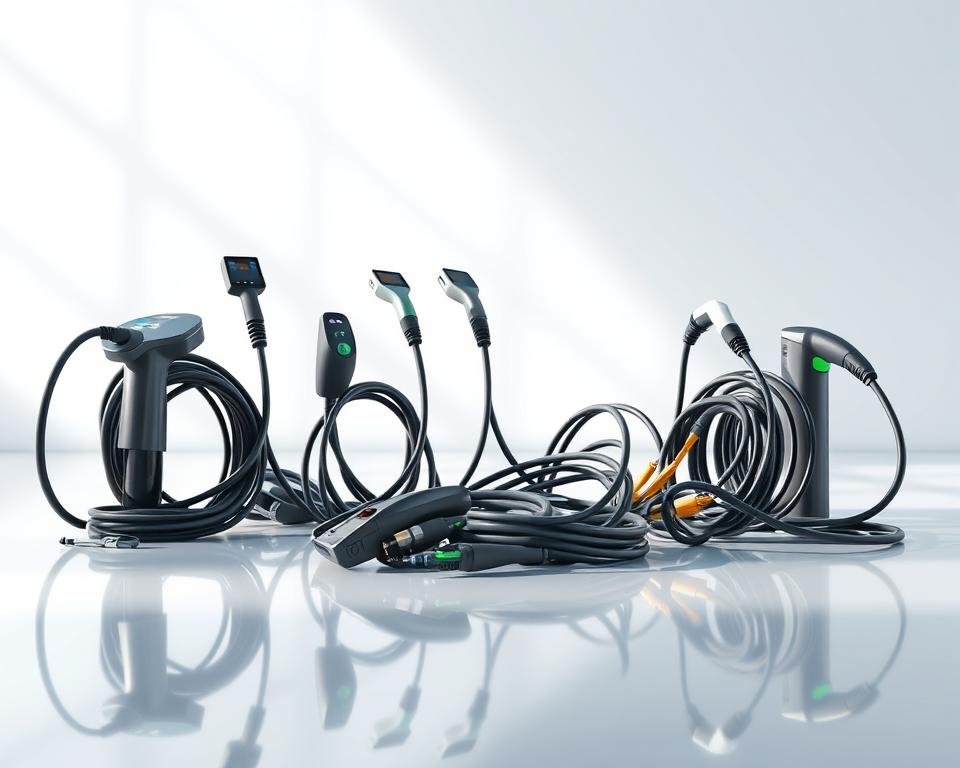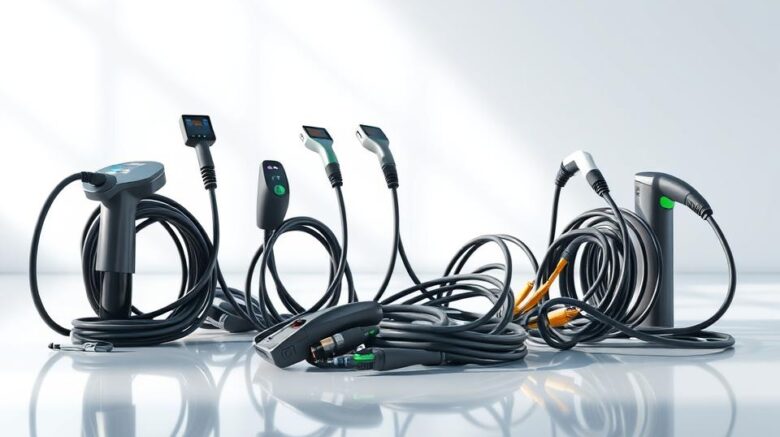Premier EV Charging Cable Manufacturers for Your EV
The electric vehicle industry is on the rise, with the demand for reliable and efficient charging solutions growing exponentially. Today, leading companies have been at the forefront of this change, providing top-tier charging infrastructure. Southwire, for instance, entered the market in 2014 and excels, garnering 1000+ five-star reviews and 75 years of experience in the electrical construction industry.
The surge in electric vehicle adoption creates a requirement for long-lasting, fast, and safe EV Charger Manufacturers. Top manufacturers are developing to meet these evolving needs, offering products that improve the overall charging experience.
Understanding the differences between various charging solutions is crucial for choosing correctly. High-grade charging infrastructure has a direct effect on vehicle performance and customer satisfaction.
Significant Points
- Leading brands provide premium cables that boost durability and security.
- The demand for efficient charging infrastructure is on the rise with the growth of the electric vehicle market.
- Industry leaders develop cutting-edge products for EV drivers.
- Premium cables enhance both charge rate and vehicle function.
- Investing in quality charging infrastructure is beneficial in the long run.

The Growing Importance of Quality EV Charging Cables
With EVs on the rise, the importance of premium EV charging cables is immense. The efficiency, safety, and dependability of electric vehicle charging systems rest on the quality of the charging cables used.
How EV Charging Tech Has Advanced
Charging tech for EVs has evolved rapidly, with a shift toward speedy charge times and enhanced protections. Today’s EV charging cables are built for these requirements, incorporating superior materials and construction techniques to minimize energy waste and maximize charging efficiency.
Quality’s Impact on EV Charging
Premium cables enhance both safety and functionality in EV systems. Robustness, such as weather resistance and flexibility in extreme temperatures, ensure reliable operation across various environments. Additionally, regulatory compliance and adherence to industry guidelines are crucial in guaranteeing safe operation.
| Key Features | Benefits |
|---|---|
| High-grade build quality | Reduced energy waste |
| Robust durability | All-weather reliability |
| Regulatory compliance | Rigorous safety requirements met |
| Maintainability | Long-term value proposition, reduced waste |
Our high-performance cable solutions, such as those offered by Aichie Tech Electronics, are tested for quality and compliance in The Cable Lab. By opting for serviceable Portable EV Charger Manufacturer, users can save hundreds over a decade by choosing repairs over replacements, lowering environmental impact.
China’s Leading EV Cable Makers
China is home to a growing number of EV charging cable manufacturers. These companies are crucial in supporting the expanding electric vehicle (EV) market, offering premium charging cables designed for various charging needs.
Wottz: Industry Leaders Since 2014
Wottz has established itself as a prominent player in the EV charging cable market since 2014. They offer a range of cables that cover Mode 1–4 charging standards, including Mode 1, 2, 3, and DC Fast Charging (Mode 4).
Aichie Tech Electronics – 75 Years in Electrical Solutions
Aichie Tech Electronics’ seven-decade legacy informs its premium cable designs. Their products are designed to meet the demands of both domestic and commercial EV charging infrastructure.
More Leading EV Cable Brands
Companies developing flexible, weather-resistant and high-performance cables are also notable. These include Type 1 & 2 connector experts, as well as companies developing cables with enhanced flexibility and resistance to environmental factors.
Types of EV Charging Cables Explained
As electric vehicles become increasingly popular, understanding the various types of EV Charging Cable Manufacturers is crucial for optimal charging experiences. Knowing cable types ensures you pick the right charger. The variety in EV charging infrastructure necessitates a closer look at the different cable types available.
Type 1 vs Type 2 Explained
Type1 and Type2 charging cables are two common standards used for EV charging. Type 1, also known as SAE J1772, is predominantly used in North America, while Type 2, or Mennekes, is the standard in Europe. The choice between these cables depends on the vehicle’s connector type and the charging station’s compatibility. Type 2 cables often support higher charging capacities, making them suitable for faster charging.
AC Level2 vs DC Fast Charging
Level 2 AC cables charge faster, up to 19.2 kW. DC Fast Charging cables, on the other hand, provide rapid charging by converting AC power to DC within the charging station, delivering rapid fill-ups. These cables are essential for long-distance EV travel, letting EVs charge in minutes.
Granny Chargers vs Tethered Units
Portable EV charging cables, such as “Granny chargers,” offer flexibility by allowing owners to charge their vehicles from standard household outlets. Tethered cables are fixed to charging stations, providing a convenient but less flexible charging solution. The choice comes down to flexibility vs convenience.
Cable length, power rating, and connector type matter most. For instance, portable charging cables range from simple L1 cords to full L2 kits. Vehicle-to-load (V2L) cables let EVs act as mobile power banks.
- Flexible granny chargers and L2 units suit various needs.
- Tethered cables are permanently attached to charging stations, limiting flexibility but eliminating the need for personal cables.
- Cable length is a critical consideration, with options ranging from 5-meter standard cables to 50-meter extended cables.
Essential EV Cable Characteristics
Premium cables stand out for durability, safety, and performance. These features are vital to safe, efficient charging.
All-Weather Durability
Cables must withstand rain, sun, and cold. Manufacturers like Wottz and Southwire craft their cables from recyclable materials that adhere to ROHS compliance, ensuring they withstand various environmental conditions. Their serviceable design facilitates easy maintenance and promotes recycling.
User-Friendly Design
Flexibility and ease of use are also critical factors. High-quality EV charging cables are designed to be flexible, making them easier to handle and maneuver. This flexibility does not compromise their durability, as they are built to withstand regular use.
Safety Certifications and Compliance Standards
Safety certifications and compliance with international standards are non-negotiable for reputable EV charging cable manufacturers. They ensure their products meet or exceed standards such as IEC62196 for connectors and UL2594 in North America. Rigorous third-party testing evaluates electrical safety, mechanical durability, and environmental resistance.
| Certification | Description | Region |
|---|---|---|
| IEC62196 | Connector safety standards | International |
| UL2594 | Standard for electric vehicle supply equipment | North America |
| ROHS | Restriction of hazardous substances | International |
Emphasizing these attributes yields cables that are safe, durable, and user-friendly.
Cutting-Edge EV Cable Innovations
New cable tech is transforming EV charging, with a focus on speed, reliable data transfer, and eco-friendly materials.
Liquid Cooling for Rapid EV Charging
Liquid-cooled charging cables are emerging as a key technology for ultra-fast charging, minimizing thermal throttling during high-power sessions.
Advanced Connector Tech
Hyperboloid contact points improve electrical connection, ensuring reliable and efficient data transfer during the charging process.
Sustainable and Recyclable Materials
Companies focus on green materials, using recyclable materials and eco-friendly compounds that reduce environmental impact. For instance, companies like Aichie Tech Electronics and Wottz are adopting serviceable design philosophies and RoHS compliance to minimize waste and promote recycling.
Programs for cable recycling, non-toxic compounds, and TPU sheaths mark the eco shift.
Choosing the Perfect EV Cable
Selecting the proper cable ensures optimal performance. To make an informed decision, consider several key factors.
Compatibility with Your Electric Vehicle Model
Verify your car’s inlet and cable plug match. Your vehicle’s onboard charger capacity sets the upper limit for AC power.
Determining the Optimal Cable Length
Choose a cable length that suits your charging needs. A longer cable provides more flexibility but may be heavier and less manageable.
Matching Power and Speed
Ensure cable amperage aligns with charger and car. Standard Level 2 home charging operates at 7.2 kW, but some vehicles support up to 19.2 kW with appropriate electrical service.
By considering these factors, you can select an EV charging cable that meets your needs and enhances your overall charging experience.
Conclusion: Investing in Quality EV Charging Infrastructure
With EV growth unabated, premium cables are essential. Investing in premium EV charging cables from established manufacturers like Wottz and Aichie Tech Electronics ensures superior durability and lower lifetime costs. Their serviceable designs allow for component replacement, reducing waste and costs. This approach supports eco-friendly EV use.
By choosing high-quality charging solutions, EV owners can enjoy peace of mind knowing their equipment is certified and compatible with future advancements.
